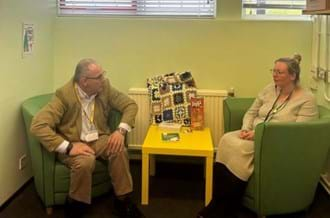In-school mental health support can reduce school exclusions, finds Place2Be and University of Cambridge study
School-based mental health interventions may positively influence educational engagement as well as mental health, according to a new study from Place2Be and the University of Cambridge, published in Child and Adolescent Mental Health.

Place2Be’s research team worked in partnership with a team at the University of Cambridge to explore the relationship between mental health and school exclusion for a cohort of children and young people receiving Place2Be’s one-to-one counselling.
Analysing data on over 6,712 four to sixteen-year-olds from 369 schools, researchers compared fixed period school exclusion rates between the academic year before and the academic year in which the child attended counselling.
The research also used data from the Strengths and Difficulties Questionnaire (SDQ) completed by teachers and parents.
The study found that despite more complex and severe initial difficulties, and facing greater adversity, children and young people who experienced school exclusion prior to counselling demonstrated a significant reduction in school exclusion in the academic year that the counselling took place.
- 74% of the students who had a fixed period exclusion before counselling (326 of 440 students) had fewer reported exclusions in the year they attended counselling
- More than half (56%) did not have any further subsequent exclusions
- Students also had better mental health, measured by the teacher reported SDQ.
Dr Kati Toth, Lead author and Senior Data Analyst at Place2Be, said:
Professor Tamsin Ford, Professor of Child and Adolescent Psychiatry at the University of Cambridge, added:
“We have pre and post intervention data without a control group, so we cannot assume causality, however, it is hugely encouraging that attendance at individual counselling predicted fewer exclusions and improved mental health among these very vulnerable children.”
To learn more about the study and its findings, read this blog by Dr Kati Toth, Place2Be's Senior Data Analyst, and Dr Niki Cooper, Place2Be’s Clinical Director.
News & blogs

Place2Be announces Arts & Minds Gala featuring Alistair Petrie, Katie Melua and LUAP
The gala will bring together 200 guests for an evening to remember, and raise vital funds for children’s mental health.
Read more
Training as a child counsellor in a Place2Be school
We sat down with Adele to learn more about her experience of training as a child counsellor with Place2be.
Read more
Harlow MP sees impact of our embedded service during school visit
Robert Halfon visited Stewards Academy on Friday 19 April, gaining insight into how Place2Be’s service supports students.
Read more



